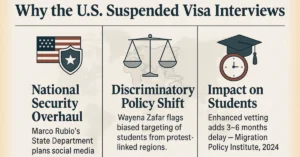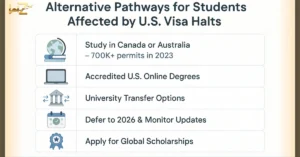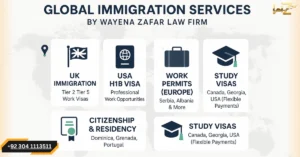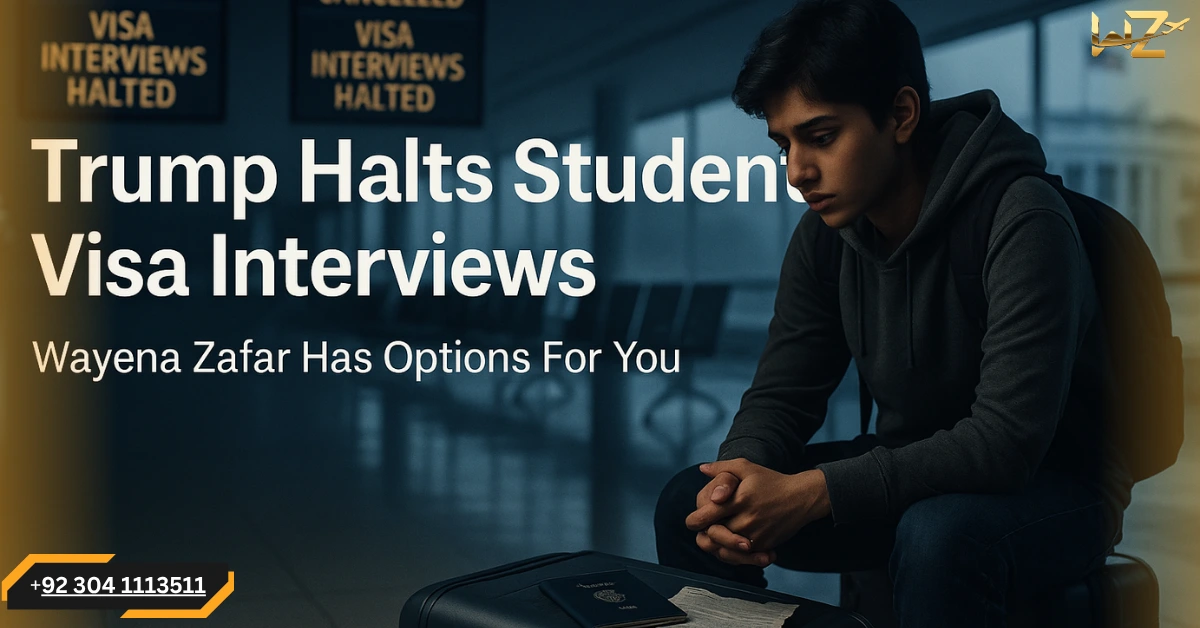On May 27, 2025, the Trump administration announced a temporary suspension of new international student visa interviews, affecting F, M, and J visa categories. This decision has sparked concern among prospective students, universities, and immigration experts, such as Wayena Zafar, a renowned immigration consultant with over 15 years of experience assisting international students.
This blog attempts to unravel the facts behind the policy and its possible implications, while tracing the intricately intertwined advocacy framework and the socio-emotional facets surrounding those impacted.
Reasons Behind the Visa Interview Suspension
Marco Rubio’s U.S. State Department announced its intention to suspend visa interview services on national security grounds. Their administration plans on revising their vetting process to include social media checks for potential terrorists, anti-Semites, or anti-Americans who could otherwise enter.
Wayena Zafar, Immigration Law firm, Lahore, points out that this change signals a deeper shift in immigration policy, emphasizing safety over ease-of-entry and discriminating against students from countries linked to campus protestor activities.

Wayena Zafar notes that this policy could disproportionately impact students from Middle Eastern and South Asian nations, where social media posts may often be scrutinized for political content. Migration Policy Institute conducted in 2024 found that enhanced vetting delays visa processing by an average of 3-6 months and creates significant obstacles to student visa approval.
Anxiety and Disappointment
The sudden halt has left students feeling stranded. Wayena Zafar Immigration Firm shares stories of clients who spent years preparing for U.S. studies, only to face uncertainty. Research from the Journal of Immigrant & Refugee Studies (2024) confirms that visa delays increase stress and depression among international students, disrupting their academic and personal lives.
A Legacy of Restrictions
This policy echoes previous Trump-era measures. During his first term, Executive Order 13780 introduced social media vetting, which slowed visa approvals. In 2025, the administration briefly revoked thousands of student visas, targeting elite institutions like Columbia and NYU, before reversing course due to legal challenges. The CEO of Wayena Zafar highlights that these actions often stem from political pressures, with universities accused of fostering “un-American” ideologies.
For example, the administration’s recent freeze of $1.8 billion in federal funding to Columbia University, citing antisemitism, underscores a pattern of linking immigration to ideological battles. The Chronicle of Higher Education (2025) reports that such policies have reduced international student enrollment by 8% since 2017, impacting academic diversity.
A Sense of Exclusion
Students feel targeted and unwelcome, emotions described as “heartbreaking but galvanizing.” A 2024 NAFSA survey found that 65% of international students felt less valued by restrictive U.S. policies, yet many remain determined to pursue their dreams.
What’s Next: Potential Outcomes
Wayena Zafar Immigration Law Firm Experts predict several scenarios:
- Stricter Vetting Protocols: The administration may roll out detailed social media checks, analyzing posts on platforms like X or LinkedIn. CEO Zafar warns that ambiguous criteria, such as defining “anti-American” content, could lead to inconsistent rejections.
- Extended Suspension: If the pause persists beyond summer 2025, universities may face enrollment drops, as international students contribute $40 billion annually, per the Institute of International Education (2024). This could strain smaller colleges reliant on tuition revenue.
- Legal Pushback: Advocacy groups, like the American Council on Education, are preparing lawsuits, citing precedents where courts overturned similar visa restrictions in 2020 and 2025. CEO Zafar expects “robust legal battles” to restore access.
- Policy Adjustment: Public and economic pressure may prompt a partial rollback, allowing limited interviews with enhanced scrutiny. However, Zafar cautions that the administration’s hardline stance makes this uncertain.
Hope in Uncertainty
Despite the challenges, Zafar emphasizes students’ resilience. A 2024 study in the International Journal of Intercultural Relations shows that students facing visa hurdles often adapt by exploring new opportunities, fostering hope and determination.
Alternative Pathways for Students
Zafar offers practical alternatives for affected students:
- Study in Canada or Australia: These countries have streamlined visa processes, issuing over 700,000 study permits combined in 2023. Zafar Immigration Consultancy recommends universities like the University of Toronto or Melbourne for their strong international programs.
- Online Degrees: U.S. institutions like Arizona State University offer accredited online programs, allowing students to study without visas. Zafar advises verifying program recognition in students’ home countries.
- Transfer Options: Students at targeted universities can transfer to less-affected institutions. Zafar suggests consulting Designated School Officials to maintain visa status.
- Defer Admission: Deferring enrollment to 2026, while monitoring State Department updates, is another option. Our CEO of Wayena Zafar Immigration Law firm stresses regular communication with universities to secure spots.
- Scholarships Abroad: Programs like Australia Awards or the UK’s Commonwealth Scholarships provide funding for international students, offering viable alternatives.

Empowerment Through Action
Zafar’s clients often find empowerment by taking proactive steps. A 2023 study in Higher Education Research & Development shows that students who explore alternatives report lower stress levels, reinforcing the value of agency in navigating setbacks.
Broader Implications: Universities and Beyond
The visa suspension threatens universities’ financial health, as international students support 350,000 jobs, per the U.S. Department of Commerce (2024). Zafar warns that prolonged restrictions could shift global talent to competitors like the UK, where international enrollment grew 12% in 2024. This loss extends beyond economics, diminishing cultural exchange and innovation.
A Shared Concern
The policy evokes sadness among educators and students, who value the diversity that international students bring. Zafar reflects, “These students aren’t just numbers—they’re future leaders.” Their absence could hinder advancements in fields like technology and medicine, where international students drive 40% of U.S. research, per the National Science Foundation (2024).
But do not worry, where there is a will, there is always a way.
Immigration Services by Wayena Zafar Law Firm
Beyond Malta work permits, Wayena Zafar Immigration Law Firm provides expert assistance with:
UK Immigration: Including UK Tier 2 Visa Requirements and UK Tier 5 visas for skilled and temporary workers.
USA H1B Visa: For professionals seeking U.S. opportunities.
Canada PR Investment: Permanent residency through investment programs.
Work Permits: For Serbia, Albania, and other countries.
Citizenship and Residency Programs: In Dominica, Grenada, and Portugal.
Study Visas: For Canada, Georgia, and the USA (with first-year tuition payment options).
We also support Malta work permits and other regions, ensuring global accessibility.

Conclusion: Charting a Path Forward
The Trump administration’s suspension of international student visa interviews, driven by security concerns, poses significant challenges. Yet, with guidance from experts like Wayena Zafar, students can explore alternatives and remain resilient. By staying informed and proactive, aspiring scholars can navigate this uncertain landscape.
Contact Wayena Zafar Immigration consultant, for personalized guidance. Let’s advocate for inclusive education policies together.
